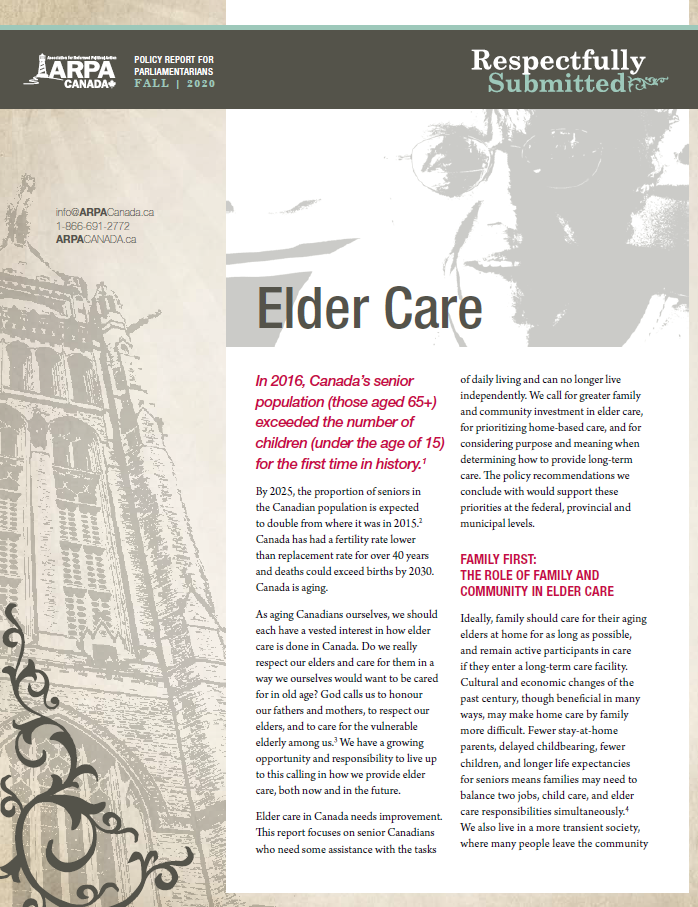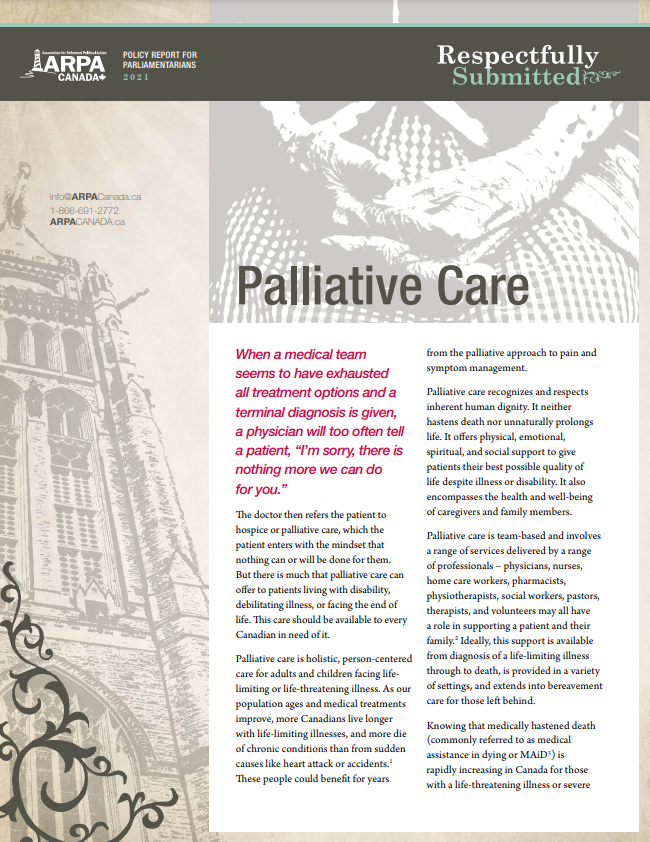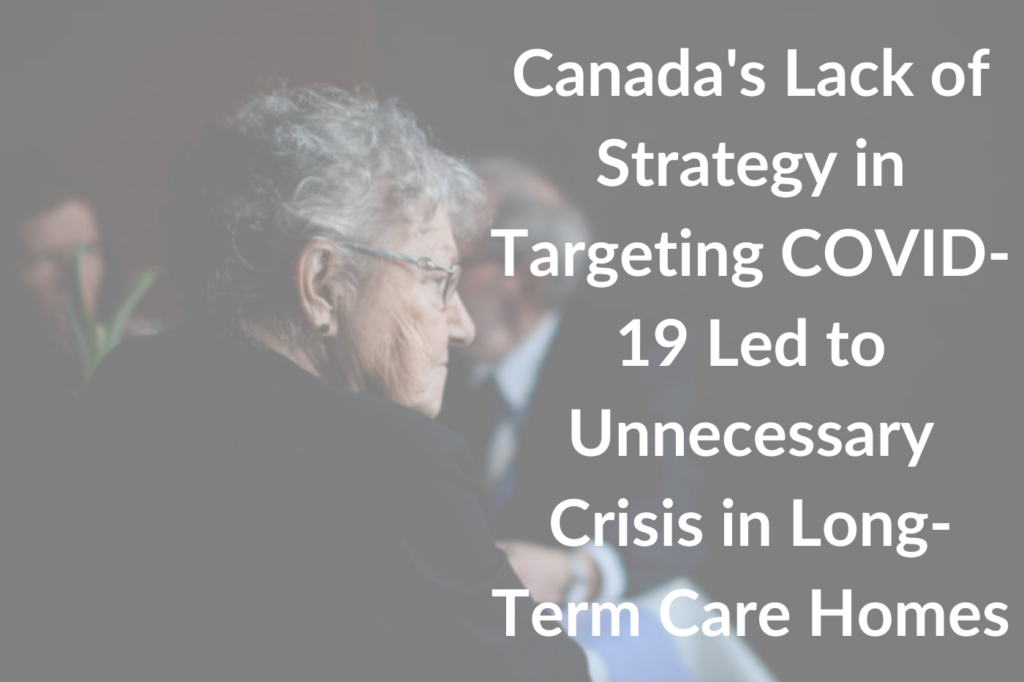
Over the past year we have been reminded of our Christian calling to care for our elders and those approaching the end of their lives. We have also seen how this calling can be combined with political action, as long-term care is getting increasing political attention.
When COVID-19 struck, long-term care homes in British Columbia were hit hard, exposing deadly flaws in how we care for seniors and bringing long-term care increasingly under public scrutiny and control. The provincial NDP and the federal NDP have issued calls for all care homes to be permanently taken over by the provincial government or local health authorities. This possibility of takeover became very real when Fraser Health revoked funding for the Delta Hospice because of its refusal to provide euthanasia. The federal government’s recent expansion of the eligibility for euthanasia (Bill C-7) only increases the need for Christians and our wider society to provide better palliative care, rather than encouraging or enabling the vulnerable to end their lives because of a lack of adequate care. In the midst of this, ARPA Canada released policy reports on Elder Care and Palliative Care – reports for which we can only thank God for the timing, as we began drafting them before knowing the impact COVID-19 would have on long-term care in Canada.
ARPA Canada has long been advocating for a culture that prioritizes caring, not killing. Through our Care not Kill campaign, we have focused on combatting efforts to expand assisted killing. Now we are expanding our efforts to intentionally promote caring as the alternative.
In the final weeks before the summer we are launching a new Called to Care initiative in British Columbia. There are three phases to this campaign.
Phase 1: Read it!
Until last year, ARPA did not have much expertise in the area of how different levels of government should support elder care and palliative care, and how Christians should be involved in these particular issues. If you also need to brush up on your knowledge on these issues, we have several resources that we hope you’ll find helpful for participating in this campaign. For an in-depth look at elder care or palliative policy from a Christian perspective, you can read our elder care or palliative care policy report. If you’d prefer shorter articles focused on specific aspects of elder care, give the articles below a read. If you prefer to watch and listen rather than read, check out André and Anna’s presentation on elder care.
Phase 2: Live it!
For this phase in our campaign, we’re venturing into new territory. ARPA is the Association for Reformed Political Action, meaning that our raison d’etre is to spur political action, not specifically to promote social action. Yet, we believe that the biblical mandate to care for our elders – and all those who are vulnerable in our society – is not a task given first and foremost to governments but to individuals, families, and the Church. This is laid out in detail in our elder care and palliative care policy reports.
So live it! Children and grandchildren, visit and care for your parents and grandparents, your uncles and aunts, your great-uncles and great-aunts, whether that be in their own home, their assisted living community, or their long-term care home. Ask them what type of care is most meaningful, or what gives them a sense of purpose or makes them feel valued. Chat with those in the older generation at church or over the phone. Volunteer to help them with yard work or pick up their groceries. Donate to and volunteer at long-term care homes, particularly Christian homes. Send cards on birthdays or holidays, or have your kids make some art to drop off or mail to brighten someone’s day. Consider taking the family to sing hymns or play music at a long-term care home at all times of the year. Go caroling there around Christmas. There are so many ways for people of all ages and skill levels to get involved in showing our elders that they are loved and valued.
Phase 3: Preach it!
Finally, bring the message to our government that our society needs to improve care for those who are ageing or suffering. Arrange a meeting or phone call with your provincial MLA. We encourage you to focus on four of the main policy recommendations made in our elder care and palliative care policy reports:
- Protect choice in long-term care and protect the right of private for-profit and non-profit care homes to exist, particularly as the provincial and federal NDP have stated that they wish to pursue a wholly public long-term care system.
- Protect the conscience rights of all long-term care and palliative care workers and institutions, such as the former Delta Hospice, if they refuse to provide euthanasia. Currently, religious hospices are exempt from providing euthanasia, but non-religious hospices are required to provide euthanasia. Ask your representative to continue to not only defend the right of faith-based institutions not to provide euthanasia but expand that exemption to any health care professional or long-term care institution that conscientiously objects to providing euthanasia.
- Push for the introduction of a bill that designates family members as essential visitors in long-term care facilities. An NDP MPP proposed an excellent bill, the More Than a Visitor Act, in Ontario. Urge your local MLA to introduce and support similar legislation.
- Provide palliative care beds and specialized palliative care consultation teams in every community, based on hospital and community size, to immediately increase access to and attention on palliative care.
As always, your can use our EasyMail system to contact your MLA, or EasyLetter to write a letter to your local newspaper editor raising these points. But we encourage you to get creative in your messages for this campaign. Consider:
- If you are an elder, tell your personal story of how essential visitors are to your well-being, or how you value the option to live in a Christian care home surrounded by staff and acquaintances that share your beliefs rather than in a government-run care home. Tell your story to your MLA or your local newspaper. In our world, stories are incredibly powerful at changing hearts and minds.
- If you are a young person, interview your grandparents about how they would like to be cared for as they grow older, or talk about some of the freedoms you hope to keep as you age. Post that video to social media or send it off to your MLA.
- If you are a health care professional, particularly if you work in long-term care, speak up! You are the experts who care for people firsthand. You are the ones who may face pressure by the government to participate in euthanasia. Take to social media, speak to your MLA, or write to your local paper and share your stories of how we can take better care of seniors.
Conclusion
We recently launched our Let the Church be the Church campaign, imploring our provincial government to give Christians the freedom to fulfill the duties that God has given to us. Yet, it isn’t enough that Christians just have this freedom. We also need to exercise that freedom and be leaders in showing what it means to live as the church of Christ in the world. This Called to Care campaign builds on this call to not only advocate for but also personally care for our elderly and our vulnerable neighbours.
So read it, live it, and preach it! Join us in answering the Call to Care.





